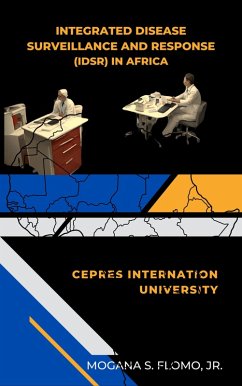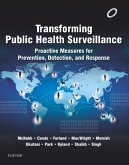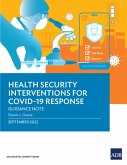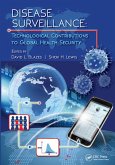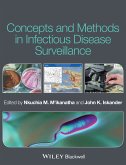Integrated Disease Surveillance and Response (IDSR) in Africa: A Comprehensive Guide" is a vital resource that offers a thorough exploration of the integrated approach to disease surveillance and response in the African context. This comprehensive guide delves into various aspects of IDSR implementation, equipping public health professionals, policymakers, and researchers with the knowledge and strategies needed to effectively address communicable diseases and strengthen surveillance systems in Africa.
The book begins by highlighting the importance of IDSR in Africa, emphasizing its role in detecting and responding to communicable diseases that pose significant public health risks. It underscores the need for a robust and integrated surveillance system to monitor the occurrence and distribution of diseases, identify outbreaks, and facilitate timely and effective response efforts.
Drawing on the historical background of IDSR implementation in Africa, the book provides valuable insights into the challenges and lessons learned from past experiences. It explores the evolution of surveillance systems, shedding light on the progress made and the areas that require further improvement. By understanding the historical context, readers gain a deeper appreciation for the development and significance of IDSR in Africa.
The book then delves into the core components of the IDSR framework, outlining the essential elements necessary for its successful implementation. It covers the entire surveillance cycle, from data collection and management to reporting and feedback mechanisms. Readers learn about the different surveillance strategies and techniques employed to collect, analyze, and interpret data, enabling them to make informed decisions and take appropriate actions based on the findings.
A major focus of the book is disease-specific surveillance, addressing communicable diseases that pose significant public health challenges in Africa. It provides an in-depth examination of the epidemiology, transmission, and control strategies for these diseases. Real-world case studies highlight successful disease-specific surveillance initiatives, offering practical examples of how surveillance efforts can be tailored to specific diseases and contexts.
Recognizing the critical role of laboratory services in disease surveillance and response, the book dedicates a chapter to exploring the importance of accurate and timely laboratory diagnosis. It discusses the integration of laboratory testing into surveillance activities, showcases case studies of how laboratory services support IDSR in Africa, and emphasizes the need for strong collaboration between laboratories and surveillance systems.
Capacity building for IDSR implementation is another key theme addressed in the book. It underscores the significance of training and effective communication in strengthening surveillance systems and equipping healthcare workers with the skills and knowledge necessary to carry out surveillance activities. Real-world case studies demonstrate successful capacity building initiatives in Africa, offering practical insights and best practices for enhancing workforce capabilities.
Monitoring and evaluation play a crucial role in ensuring the effectiveness of IDSR implementation. The book highlights the importance of monitoring and evaluating surveillance systems, program performance, and outcomes. It presents evaluation frameworks and methodologies tailored to IDSR, enabling stakeholders to assess progress, identify strengths and weaknesses, and make evidence-based decisions for program improvement.
The book begins by highlighting the importance of IDSR in Africa, emphasizing its role in detecting and responding to communicable diseases that pose significant public health risks. It underscores the need for a robust and integrated surveillance system to monitor the occurrence and distribution of diseases, identify outbreaks, and facilitate timely and effective response efforts.
Drawing on the historical background of IDSR implementation in Africa, the book provides valuable insights into the challenges and lessons learned from past experiences. It explores the evolution of surveillance systems, shedding light on the progress made and the areas that require further improvement. By understanding the historical context, readers gain a deeper appreciation for the development and significance of IDSR in Africa.
The book then delves into the core components of the IDSR framework, outlining the essential elements necessary for its successful implementation. It covers the entire surveillance cycle, from data collection and management to reporting and feedback mechanisms. Readers learn about the different surveillance strategies and techniques employed to collect, analyze, and interpret data, enabling them to make informed decisions and take appropriate actions based on the findings.
A major focus of the book is disease-specific surveillance, addressing communicable diseases that pose significant public health challenges in Africa. It provides an in-depth examination of the epidemiology, transmission, and control strategies for these diseases. Real-world case studies highlight successful disease-specific surveillance initiatives, offering practical examples of how surveillance efforts can be tailored to specific diseases and contexts.
Recognizing the critical role of laboratory services in disease surveillance and response, the book dedicates a chapter to exploring the importance of accurate and timely laboratory diagnosis. It discusses the integration of laboratory testing into surveillance activities, showcases case studies of how laboratory services support IDSR in Africa, and emphasizes the need for strong collaboration between laboratories and surveillance systems.
Capacity building for IDSR implementation is another key theme addressed in the book. It underscores the significance of training and effective communication in strengthening surveillance systems and equipping healthcare workers with the skills and knowledge necessary to carry out surveillance activities. Real-world case studies demonstrate successful capacity building initiatives in Africa, offering practical insights and best practices for enhancing workforce capabilities.
Monitoring and evaluation play a crucial role in ensuring the effectiveness of IDSR implementation. The book highlights the importance of monitoring and evaluating surveillance systems, program performance, and outcomes. It presents evaluation frameworks and methodologies tailored to IDSR, enabling stakeholders to assess progress, identify strengths and weaknesses, and make evidence-based decisions for program improvement.
Dieser Download kann aus rechtlichen Gründen nur mit Rechnungsadresse in A, B, CY, CZ, D, DK, EW, E, FIN, F, GR, H, IRL, I, LT, L, LR, M, NL, PL, P, R, S, SLO, SK ausgeliefert werden.

